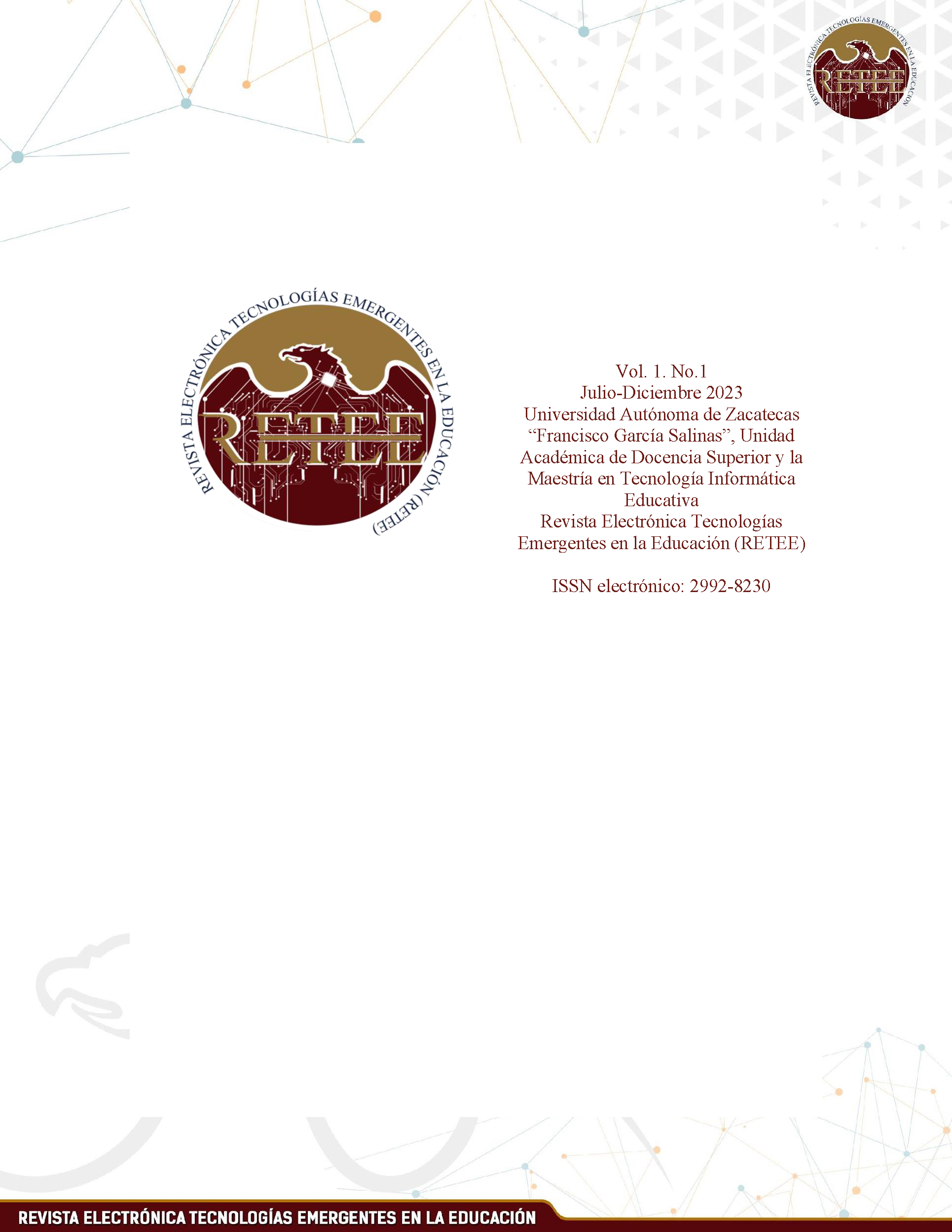Experience of working in digital distance mode in a postgraduate programme of the academic unit of higher education
Published 2023-11-22
Keywords
- EaD digital,
- online learning,
- hybrid learning,
- postgraduate course,
- systematisation of experiences
Copyright (c) 2023 Revista Electrónica Tecnologías Emergentes en la Educación

This work is licensed under a Creative Commons Attribution 4.0 International License.
How to Cite
Abstract
The events of the health contingency period clearly exposed the potential of alternative modalities to face-to-face education, such as digital distance education. In accordance with this, the work that is presented here investigates the perception of the students of a postgraduate programme of the Academic Unit of Higher Education of the Autonomous University of Zacatecas (UAZ), This qualitative research is based on the method of systematisation of experiences, by means of a questionnaire applied to the students of the programme.The document argues from concepts such as distance education, the implications of mediation through digital technologies, as well as some models that compose it as virtual, online and hybrid learning. Another of the guiding concepts is active learning and its link to distance education. Some of the results obtained show the importance of considering transactional distance in the design of the seminars, for which it is important to take into account the communication and accompaniment given to the students, as well as the need to diversify the methodologies and strategies with which the courses are developed, concluding with the acceptance of working in a digital distance modality and the relevance of the postgraduate programme having its own proposed model to face the new educational challenges.
Downloads
References
- CEPAL-OPS (2021). La prolongación de la crisis sanitaria y su impacto en la salud,la economía y el desarrollo social. Colmenares E., A. M. (2012). Investigación-acción participativa: una metodología integradora del conocimiento y la acción. Voces y Silencios: Revista Latinoamericana de Educación, 3, 102–115. Forbes. (2021). Cuarta ola de Covid-19 en Europa impacta con notable alza de contagios. García Aretio, L. (2018). Blended learning y la convergencia entre la educación presencial y a distancia. RIED. Revista Iberoamericana de Educación a Distancia, 21(1), 9. https://doi.org/10.5944/ried.21.1.19683García-Aretio, L. (2020a). A Semantic jungle: distance/virtual/online/digital/ electronic education/teaching/learning? RIED-Revista Iberoamericana de Educacion a Distancia, 23(1), 9–28. https://doi.org/10.5944/ried.23.1.25495García-Aretio, L. (2020b). Con el COVID-19, más bosque semántico. Contextos Universitarios Mediados, 23(1), 9–28. https://doi.org/10.5944/ried.23.1.25495Ibarra, M. (2021). Propuesta de educación a distancia para la Universidad Autónoma de Zacatecas: Un acercamiento al modelo híbrido. In E. Ruiz-Velasco & J. Bárcena (Eds.), Transformación digital educativa (pp. 386–397). UNAM, SOMECE, ICAT.INEGI. (2020). Estadísticas a propósito del día del trabajo. Comunicado de prensa núm. 166/20, 1–2.
- Jara Holliday, O. (2011). Orientaciones teórico-prácticas para la sistematización de experiencias. Revista DECISIO Saberes para la acción en educación de adultos, 28, 1–17. http://centroderecursos.alboan.org/ebooks/0000/0788/6_JAR_ORI.pdf Lopera, C. M. (2020). 125 Cambios que provocará el Covid a las Instituciones de Educación Superior.Pronósticos de El Observatorio. El Observatorio de la Universidad Colombiana. Obtenido de: https://www. iesalc. unesco. org/wp-content/uploads/2020/05/125-cambios-que-provocara% CC.Mathieu, E., Ritchie, H., Ortiz-Ospina, E., Roser, M., Hasell, J., Appel, C., Giattino, C., & Rodés-Guirao, L. (2020). Coronavirus Pandemic (COVID-19). Our World in Data, 5(7), 947–953. https://doi.org/10.1038/S41562-021-01122-8Miao, F., Mishra, S., Orr, D., & Janssen, B. (2020). Directrices para la elaboración de políticas de recursos educativos abiertos(UNESCO). UNESCO y Commonwealth of Learning.Moore, M. G. (2018). The theory of transactional distance. En M. G. Moore & W. Diehl (Eds.), Handobook of Distance Education (p. 606). Routledge. https://doi.org/https://doi.org/10.4324/9781315296135Restrepo, R., & Waks, L. (2018). Aprendizaje activo para el aula: una síntesis de fundamentos y técnicas.SEP (2023). Criterios Generales para la Distribución de los Recursos Autorizados al Programa Presupuestario U079 “Programa de Expansión de la Educación Media Superior y Superior”(Tipo Superior). En Secretaria de Educación Pública. Soletic, Á., & Kelly, V. (2022). Estudio de políticas digitales en educación en América Latina. Tendencias emergentes en contexto de pandemia y perspectivas de futuro.Torres-Gordillo, J., & Herrero-Vázquez, E. (2016). PLE: Entorno Personal de Aprendizaje VS Entorno de Aprendizaje Personalizado. Revista Española de Orientación y Psicopedagogía, 27(3), 26–42. http://www.redalyc.org/articulo.oa?id=338250662003UNESCO. (2015). Declaración de Quingdao (2015). Aprovechar las oportunidades digitales. Liderar la transformación de la educación.Valle, L. (2021). Desertan 6 mil de la UAZ | NTR Zacatecas .com. NTR. http://ntrzacatecas.com/2021/05/24/desertan-6-mil-de-la-uaz/


